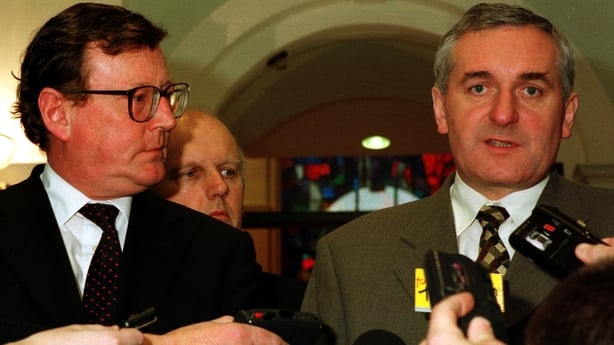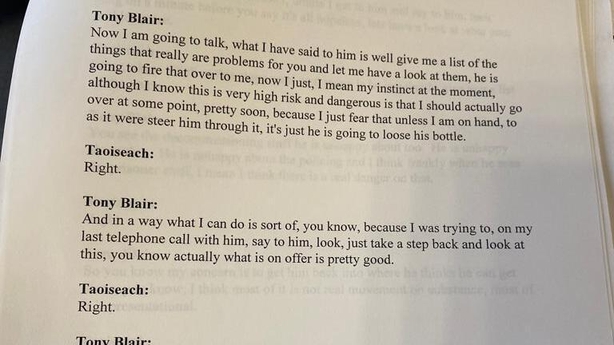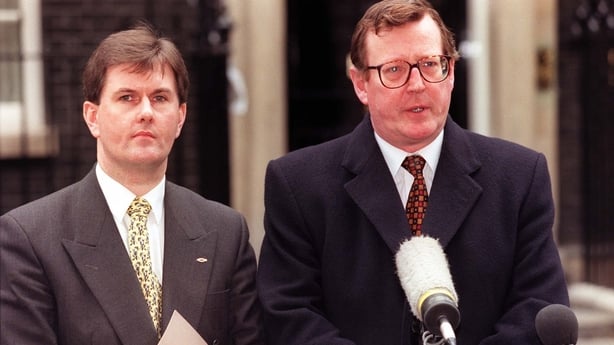By David McCullagh, Conor McMorrow and Justin McCarthy
The final chaotic scramble to get the Good Friday Agreement over the line is revealed in newly released State Papers, which detail the close contact between Bertie Ahern and Tony Blair.
As the clock ticked down towards the deadline, the two leaders debated when to intervene to secure a deadline, how to keep the "frightened" David Trimble onside, and how to balance personal grief with public duty.
Blair had been worried since he became prime minister about keeping the Ulster Unionists and their leader David Trimble on board. It was hard work.
On the day the IRA resumed its ceasefire, 20 July 1997, he complained to Ahern that the unionists were making decommissioning a precondition to talks. They were "asking… us to say that unless from day one the weapons are getting handed in, we are going to chuck Sinn Féin out of the talks. I mean, that's just hopeless".
'We are putting our changes, our commitments in concrete. They must do so too'
Decommissioning remained a bugbear; but as the shape of a deal came into sight, other issues came to the fore – particularly the cross-border bodies, which were vital to nationalists, but which unionists detested.
Under pressure from Trimble, Blair tried to soften the commitment to these bodies. But Ahern put his foot down. Speaking points for a meeting in London on 1 April show the taoiseach determined not to surrender to what he saw as Trimble’s intransigence.
"Unionists cannot be allowed to blow this prize, as they have done so often in history. We are putting our changes, our commitments in concrete. They must do so too. If not, an agreement makes no sense. We can’t have concrete on one side, and sand on the other... The status quo with a few 'add-ons’ will not work."

As far as the Irish Government was concerned, unionists were getting "a huge historical prize, the acceptance by nationalist Ireland, North and South, of the position of Northern Ireland within the UK". In return, there had to be a meaningful commitment to cross-border bodies.
In a phone call on 6 April, Blair claimed that Trimble's problem was with presentation, particularly with the list of proposed cross-border bodies attached to the draft agreement: "I genuinely believe that if we don’t move significantly on language then we’ve not got a prayer with Trimble… when you get a list as long as that…".
'Hold Trimble's hand'
Blair said Trimble was worried about being attacked by DUP leader Ian Paisley. In a later phone call, Ahern said he had been watching Paisley "out doing his ranting and raving" on the television. "In some ways I suppose that'll make David a bit shaky but… just watching it back on the news there a while ago, if I was David I’d feel confident because it looked like, you know, just off the wall kind of stuff...".
Off the wall or not, it was making Trimble extremely nervous, to the extent that Blair thought about going to Belfast to join the talks himself, which he feared might collapse "unless I'm there to hold Trimble’s hand".
He returned to the idea in another phone call the next day: "My instinct at the moment, although I know this is very high risk and dangerous, is that I should actually go over at some point, pretty soon, because I just fear that unless I am on hand, to, as it were, steer him through it, it’s just he [Trimble] is going to lose his bottle... he is frightened basically."

Ahern, with years of experience of industrial relations negotiations behind him, was more cautious, advising Blair to hold off: "Once we go in, we have to stay with it, I think. If we go in too early, then you get caught...".
A further complicating factor was the death of the taoiseach’s mother, Julia Ahern, just days before the culmination of the talks. Funeral arrangements made travelling to Belfast awkward, not to mention the strain of dealing with bereavement while conducting a complex negotiation.
But when Blair raised the point, Ahern had no doubts: "It’s okay, she – no better woman – she would want to see me trying to solve the problem."
Ahern was annoyed that a compromise agreed by the two governments the previous night had been set aside by the Ulster Unionists
The following day, 8 April, the two men met for breakfast at Hillsborough Castle. Having met Trimble for two hours the previous evening, the prime minister said he wasn’t bluffing, and if there wasn’t movement on the list of cross-border implementation bodies, "the Governments would probably have to begin to work out an exit strategy".
This was a key moment in the entire process: Ahern was faced with the choice of risking the collapse of the talks, or backing down over what he regarded as a key part of the proposed deal.
The temptation to compromise must have been immense: but he insisted that the cross-border bodies must have real teeth. "If Trimble was only prepared to contemplate 'chat-shows’ in Strand Two [North-South relations], it would be best to organize an exit strategy at this stage".
Blair gave a conciliatory answer, insisting that Trimble was prepared to agree substantial North/South bodies, and that it was only a question of presentation.
Donaldson stance 'involved posturing'
The problem dominated the following day’s breakfast meeting as well. Ahern was annoyed that a compromise on the issue agreed by the two governments the previous night had been set aside by the Ulster Unionists, who were now attempting to reopen the negotiation, with Jeffrey Donaldson trying to have the bodies set up by legislation in the Assembly rather than at Westminster.
The problem with this, Ahern pointed out, was that he couldn’t depend on unionists actually introducing such legislation if it was up to them: "The fundamental difficulty… was that we did not trust the Unionists".

Blair speculated that Donaldson’s attitude "involved a certain amount of posturing for internal advantage in the party".
Ahern agreed that "there was a lot of internal division in the UUP delegation". The official note of the conversation goes on to claim: "Trimble had tried his best to mislead his colleagues at certain points in the meeting last night (and the Taoiseach had endeavoured to be helpful to him in this respect)."
Whether due to such misdirection or not, the two leaders managed to shepherd the parties over the line the following day, and the Good Friday Agreement was signed. Though, as it quickly turned out, making the Agreement work was no easy task.
Based on documents now available to view in the National Archives of Ireland.

